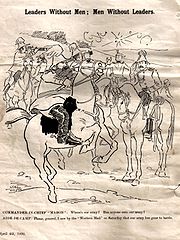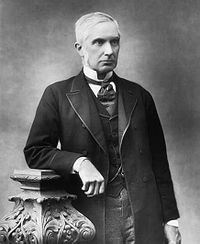
Welsh coal strike of 1898
Encyclopedia

Strike action
Strike action, also called labour strike, on strike, greve , or simply strike, is a work stoppage caused by the mass refusal of employees to work. A strike usually takes place in response to employee grievances. Strikes became important during the industrial revolution, when mass labour became...
involving the colliers of South Wales
South Wales
South Wales is an area of Wales bordered by England and the Bristol Channel to the east and south, and Mid Wales and West Wales to the north and west. The most densely populated region in the south-west of the United Kingdom, it is home to around 2.1 million people and includes the capital city of...
and Monmouthshire
Monmouthshire (historic)
Monmouthshire , also known as the County of Monmouth , is one of thirteen ancient counties of Wales and a former administrative county....
. The strike began as an attempt by the colliers to remove the sliding scale, which determined their wage based on the price of coal. The strike quickly turned into a disastrous lockout
Lockout
Lockout may refer to:* Lockout , a type of work stoppage* Lockout * Lockout chip, a computer chip in a video game system to prevent use of unauthorized software* Lock-out device, part of a signaling system used on game shows...
which would last for six months and result in a failure for the colliers as the sliding scale stayed in place. The strike is seen as an important landmark in Welsh history as it saw the true adoption of trade unionism in the southern coalfield which had to date been slow to take hold. The South Wales Miners' Federation
South Wales Miners' Federation
The South Wales Miners' Federation , nicknamed "The Fed", was a trade union for miners in South Wales.The union was founded on 24 October 1898, following the defeat of the South Wales miners' strike of 1898...
was the largest trade union to have originated from this dispute.
Reasons for the action
Towards the end of 1897 relations between south Wales colliers, led by Liberal MP William 'Mabon' AbrahamWilliam Abraham (Welsh politician)
William "Mabon" Abraham was a Welsh trade unionist and Labour politician, and a Member of Parliament from 1885 to 1920. Although an MP for 35 years, it was as a trade unionist that Abraham is most well known...
and the coalowners had become strained. Apart from the obvious wealth of the coalowners, the miners were also unhappy about a system used to determine wages called the sliding scale. The sliding scale was a system where by the collier's salary was based not only on how much coal they could mine but on the price the coal fetched at market. The miners argued that the scale could be abused by traders and did not prevent cut-throat competition; also there was no minimum to the scale. This led to many miners facing financial difficulties and in September 1897 the miners gave six months' notice to terminate the scale. The coalowners retaliated with what they described as, precautionary measures, to terminate contracts which would come into effect at the same time as the colliers' ultimatum.
Attempts to resolve the strike

In course of time, the miners shifted their position to the removal of the sliding scale completely but still demanded the 10% advance. The Board of Trade
Board of Trade
The Board of Trade is a committee of the Privy Council of the United Kingdom, originating as a committee of inquiry in the 17th century and evolving gradually into a government department with a diverse range of functions...
appointed Sir Edward Fry
Edward Fry
Sir Edward Fry GCB, GCMG, PC, FRS , was a judge in the British Court of Appeal and also an arbitrator on the International Permanent Court of Arbitration. He was a Quaker, son of Joseph Fry and Mary Ann Swaine....
to act as a concilliator, much to the approval of the colliers, but the employers refused to meet with him. Through the endeavours of Sir Edward, the colliers eventually agreed to a reduction on demands in return for the creation of a neutral Concilliation Board to fix wages if coal prices fell below a specified level. The coalowners showed interest in these options but before options were discussed, the colliers' representatives re-introduced demands and negotiations were broken. After a second failed attempt, Sir Edward returned to the Board of Trade describing the owners as obstinate and the workers as leaderless.
Outcome of the action
By August the colliers had decided to push on the single issue of retaining the sliding scale, but with a minimum level. In the end the colliers accepted an immediate advance of 5 percent and a guarantee from the coalowners that if wages fell below 12½ percent above the 1879 standard, then the men could give 6 months notice to terminate the scale. It also saw the end of Mabon's day, the first Monday of the month holiday previously awarded to the miners. The strike officially ended on September 1, 1898.The lack of organisation and vision apparent form the colliers' leaders was addressed by the foundation of the South Wales Miners' Federation, or 'the Fed'. Abraham would take the presidency of the organisation and William Brace
William Brace
William Brace was a Welsh trade unionist and Labour politician. Born in Risca, in the coal-mining district of Monmouthshire, he was one of six children of Thomas and Anne Brace. Brace briefly attended school before starting work at the local colliery, aged 12...
the vice president. After such a long strike without pay, the levels of militancy within the south Wales coalfields rose and men began joining trade unions on a level not before seen in the area.

